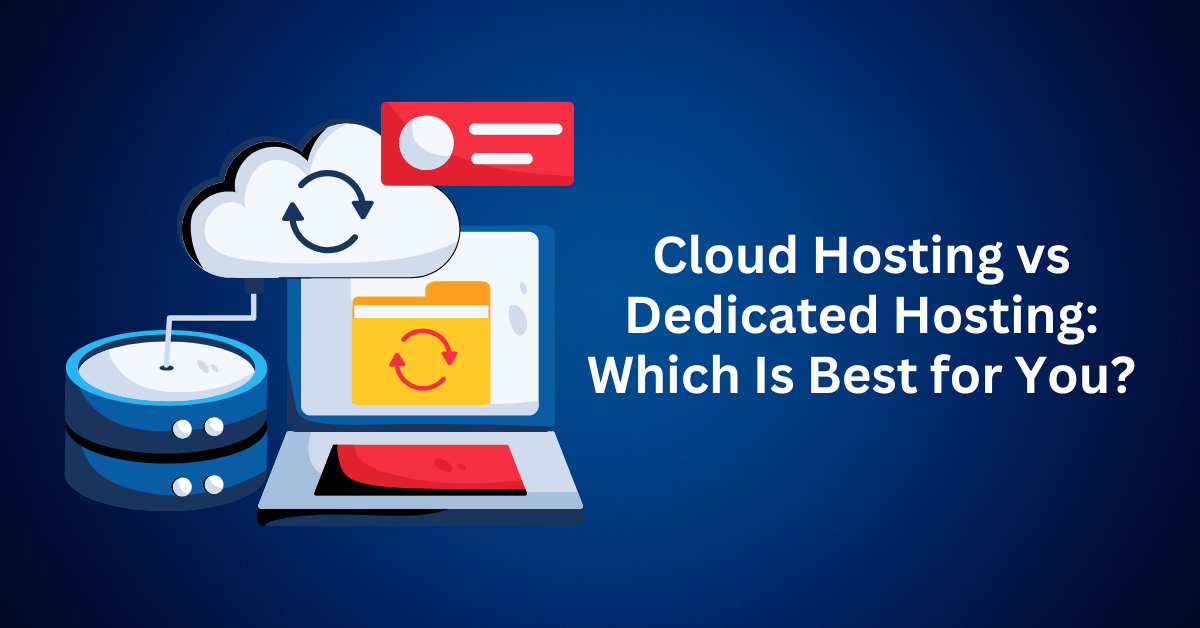In today’s expanding digital marketplace, establishing an online presence through a website is essential for business success. However, surprisingly, despite this necessity, 27% of businesses still do not have an online presence. To align with the majority (73%) that have recognized the importance of online visibility, the initial step towards digital relevance is selecting the appropriate web hosting service. This decision is pivotal as it directly impacts your website’s performance, security, and scalability. Moreover, there is a diverse array of web hosting options available, ranging from shared hosting to VPS (Virtual Private Server), dedicated hosting, and cloud hosting, each tailored to different needs and budgets.
Each option offers unique benefits and considerations, making it crucial to evaluate which type aligns best with your business goals and requirements.
In this article, we will focus on two specific hosting offerings: cloud hosting and dedicated hosting. By delving into the distinctions between these hosting types, our aim is to provide you with the insights needed to make an informed decision that aligns best with your business goals.
Moreover, understanding the differences between these two hosting solutions will empower you to choose the optimal platform to support your website’s performance, security, and growth.
Start Your Web Hosting Today with an Exclusive Discount

Table of Contents
ToggleWhat is Cloud Hosting?
Cloud hosting employs a sophisticated infrastructure comprising numerous virtual servers, commonly known as cloud servers, to oversee the management of websites and applications. This innovative approach diverges from traditional single-server setups, offering heightened flexibility and reliability. By distributing computing power and storage resources across multiple cloud servers, this model guarantees optimal performance and resilience.
Additionally, each cloud server functions independently as a virtual entity within the hosting environment, collectively contributing to its robustness and scalability. This decentralized architecture minimizes the risk of downtime or performance bottlenecks associated with conventional hosting methods, enabling seamless adaptation to varying demands and ensuring consistent service delivery.
Key Features of Cloud Hosting
Cloud hosting boasts a suite of compelling features and benefits that set it apart as a preferred solution for businesses of all sizes.
Let’s get into these advantages:
1. Scalability:
Cloud hosting offers unparalleled scalability compared to dedicated servers. Users can dynamically adjust virtual resources—such as computing power and storage—based on current demands. This flexibility also enables businesses to effortlessly manage unexpected spikes in traffic without the need for permanent investments in higher-capacity hardware.
2. Cost Efficiency:
One of the most appealing aspects of cloud hosting is its pay-as-you-go model. Users only pay for the resources they consume, making it a cost-effective solution. This approach then eliminates the expense associated with maintaining unused capacity, a common drawback of traditional dedicated servers.
3. Reliability:
The distributed nature of cloud hosting across multiple servers significantly enhances reliability. In the event of a server failure, automated failover mechanisms ensure continuous service availability by redirecting traffic to operational servers. This level of resilience surpasses the inherent risks of relying solely on a single dedicated server.
4. Accessibility:
Cloud hosting providers prioritize zero downtime, ensuring uninterrupted access to services. This accessibility is particularly beneficial for businesses with remote teams or those requiring seamless access from multiple locations. Cloud environments facilitate remote collaboration and support a distributed workforce with consistent connectivity.
5. Advanced Security:
While security concerns exist in any computing environment, reputable cloud hosting providers implement robust security measures. These include managed backups, data encryption, multi-factor authentication, and stringent access controls. Such measures often exceed the security provisions available with traditional dedicated servers.
6. Maintenance and Upgrades:
Cloud hosting eliminates the burden of server maintenance and upgrades from users. Hosting providers handle routine tasks such as software updates, hardware maintenance, and security patches. This frees up valuable resources and ensures that businesses can focus on core activities without the distraction of server management.
Who Should Use Cloud Hosting?
Cloud hosting is particularly advantageous for various types of businesses and organizations:
eCommerce Sites
During peak sales periods, eCommerce sites experience a surge in traffic. Cloud hosting enables these sites to handle increased traffic seamlessly without service interruptions. The scalable nature of cloud resources also ensures that the site can accommodate high volumes of visitors. Hence, optimizing the user experience during critical sales events.
Startups with Growth Plans
Besides, startups often have ambitious growth targets. Cloud hosting allows startups to quickly scale their resources in response to growing user demand. This flexibility ensures that startups can efficiently manage their infrastructure costs while expanding their operations to meet evolving business needs.
Seasonal Businesses
For businesses with seasonal fluctuations in demand, such as holiday-themed stores or tourism websites, cloud hosting offers a cost-effective solution. Seasonal businesses can adjust their hosting capacity based on anticipated spikes and dips in traffic. This can help to optimize resource allocation and minimize unnecessary expenses during off-peak periods.
Websites Requiring High Uptime
Websites that require continuous availability and uptime, such as news portals, financial institutions, or customer support platforms, benefit from the robust infrastructure of cloud servers. Cloud hosting’s redundancy and failover capabilities ensure that these critical sites remain accessible even in the event of hardware failures or maintenance activities.
Agencies Managing Multiple Client Portfolios
Digital agencies that oversee websites and applications for diverse clients benefit significantly from cloud hosting’s flexibility. Cloud resources can be dynamically allocated across different client projects based on varying traffic and demand patterns. This agility also allows agencies to optimize resource usage efficiently, ensuring that each client’s website performs optimally without over-provisioning resources or excessive manual intervention.
Cloud hosting empowers businesses across various industries to leverage scalable, reliable, and cost-effective infrastructure tailored to their specific needs. Whether managing fluctuating traffic, accommodating growth ambitions, or optimizing resource allocation across multiple client portfolios, cloud hosting offers a versatile solution for modern digital operations.
Start Your Web Hosting Today with an Exclusive Discount
What is Dedicated Hosting?
Dedicated hosting is a type of web hosting where a business rents an entire server exclusively for its own use. This is different from VPS hosting, which involves sharing a physical server with others in an isolated environment, or shared hosting, where resources are shared among multiple clients. With dedicated hosting, the server is yours alone. This gives you complete control over its configuration and use.
Key Features of Dedicated Hosting
Dedicated hosting offers several compelling advantages, making it an ideal choice for businesses seeking robust performance, enhanced security, and complete control over their server environment:
1. Performance
Dedicated hosting ensures optimal performance by dedicating all server resources—such as CPU, memory, and disk space—exclusively to a single client. This allocation will also eliminate the performance bottlenecks associated with shared hosting environments. Hence, this results in faster load times, improved responsiveness, and reliable handling of high-traffic volumes. Your website or applications will operate efficiently without concerns about resource contention from other users.
2. Security
With dedicated hosting, security measures can be tailored to meet your specific requirements. You have the flexibility to implement custom security configurations, including firewall rules, access controls, and encryption protocols. Since you are isolated from other hosting accounts, you are shielded from security risks that may arise in shared hosting environments, such as cross-site contamination or unauthorized access by neighbouring users.
3. Control
Complete administrative control is a standout feature of dedicated hosting. Additionally, you have full root or administrative access to the server. This will allow you to install, configure, and manage software applications and services according to your business needs. This level of control is invaluable for businesses with unique or specialized requirements that may not be supported by standard hosting solutions. Furthermore, you can optimize server settings, perform customizations, and fine-tune performance parameters to maximize efficiency and meet specific operational objectives.
4. Customization
Dedicated hosting enables extensive customization of server configurations. You have the flexibility to choose hardware specifications, operating systems, and software applications that align with your business objectives. Whether deploying complex web applications, databases, or specialized software stacks, dedicated hosting provides the flexibility to tailor the server environment to suit your exact requirements.
5. Scalability
Dedicated servers offer scalability to accommodate evolving business needs. Furthermore, as your website traffic grows or resource demands change, you can easily upgrade hardware components, allocate additional resources, or adjust server configurations without constraints imposed by shared hosting environments.
6. Reliability
Dedicated hosting ensures high availability and uptime for critical applications and services. Additionally, by eliminating the risks associated with resource-sharing in shared hosting, dedicated servers offer a stable and reliable platform for hosting mission-critical websites, e-commerce platforms, and enterprise applications.
Who Should Use Dedicated Hosting?
Dedicated servers are particularly advantageous for various types of businesses and websites with specific requirements:
High-Traffic Websites
Websites experiencing high traffic volumes benefit from dedicated servers. With dedicated resources solely allocated to your site, you can accommodate large numbers of visitors without encountering performance issues or slowdowns. This ensures consistent responsiveness and reliability even during peak traffic periods. It can optimize the user experience and minimize the risk of downtime.
Businesses with Specific Security Needs
Companies handling sensitive data or conducting secure transactions, such as eCommerce sites, financial institutions, or healthcare providers, require robust security measures. Dedicated servers offer customizable security configurations and isolation from other hosting accounts, minimizing security risks associated with shared environments. This level of security compliance is essential for protecting confidential information and maintaining regulatory compliance.
Resource-Intensive Applications
Websites or applications that demand substantial server resources, such as large databases, media streaming platforms, or complex CRM (Customer Relationship Management) systems, benefit from dedicated server resources. Dedicated servers provide ample CPU, memory, and storage capacity to support resource-intensive tasks efficiently, ensuring optimal performance and scalability for demanding applications.
Businesses Requiring Custom Configurations
Dedicated servers are ideal for businesses needing specific server configurations or running custom software applications. Moreover, with full administrative control, you can install, configure, and optimize the server environment to meet unique business requirements. This flexibility enables businesses to deploy specialized software stacks, integrate third-party applications, or implement proprietary technologies without limitations imposed by shared hosting environments.
Gaming Servers
Dedicated servers are also popular for hosting multiplayer gaming platforms and online gaming communities. Gaming servers require low-latency, high-performance infrastructure to support real-time interactions and gameplay. Dedicated servers provide the reliability and performance needed to deliver seamless gaming experiences to players worldwide.
Dedicated servers offer tailored solutions for businesses and websites with demanding performance, security, and customization needs. Furthermore, by providing exclusive access to server resources and administrative controls, dedicated hosting empowers businesses to optimize their infrastructure, enhance security posture, and deliver exceptional user experiences for their customers or end users. While dedicated hosting may involve higher costs compared to shared or VPS hosting, the benefits of dedicated resources, scalability, and customization justify the investment for organizations prioritizing performance, security, and operational flexibility.
Start Your Web Hosting Today with an Exclusive Discount

How to Choose Between Cloud hosting vs Dedicated hosting
If you’re still unsure about which hosting option suits your needs best, let’s get into a detailed comparison to guide your decision:
Dedicated Hosting:
With dedicated hosting, you get a physical server exclusively allocated to your business. This arrangement ensures top-notch performance, extensive control over server settings, and robust security measures. Dedicated hosting is especially beneficial for businesses experiencing high traffic volumes or those requiring secure storage for large datasets.
These dedicated servers reside within the web hosting provider’s data centres, featuring stringent physical security protocols and environmental controls to safeguard your data’s integrity. However, this exclusivity and enhanced control typically come at a higher cost due to the dedicated use of server resources and the comprehensive control it offers.
Cloud Hosting:
In contrast, cloud hosting operates within a virtualized environment where your website utilizes resources from multiple interconnected servers. This setup allows for dynamic adjustment of virtual resources. It provides unmatched scalability and flexibility that traditional dedicated servers cannot match.
Cloud hosting proves particularly cost-effective for businesses with fluctuating traffic patterns, enabling you to scale resources up or down in real time to meet demand, thus avoiding unnecessary costs associated with unused capacity. Moreover, the virtualized environment ensures data redundancy across multiple servers, enhancing the reliability and uptime of your website.
In the event of a server issue, the distributed nature of cloud hosting ensures that your site remains operational, drawing resources from unaffected servers to maintain seamless performance. This redundancy minimizes downtime risks and guarantees consistent service delivery.
Ultimately, choosing between dedicated and cloud hosting hinges on your specific business needs, budget considerations, and growth projections. Dedicated hosting offers unparalleled control and security ideal for stable, resource-intensive operations, while cloud hosting provides unmatched scalability and resilience tailored for dynamic, evolving businesses.
Start Your Web Hosting Today with an Exclusive Discount
Summary of Cloud hosting vs Dedicated hosting
| Aspect | Cloud Hosting | Dedicated Hosting |
| Server Environment | Virtualized environment with resources from multiple servers. | Physical server exclusively allocated to one business. |
| Resource Scalability | Resources can be scaled up or down dynamically based on demand. | Fixed resources allocated with limited scalability. |
| Cost Efficiency | Cost-effective for variable traffic, pay for what you use. | Generally more expensive due to exclusive resource use. |
| Performance | Performance can vary based on server load and network conditions. | Consistently high performance with dedicated resources. |
| Control | Limited control over underlying hardware and network configurations. | Full control over server settings and configurations. |
| Security | Less flexible scalability may require hardware upgrades for growth. | Relies on the cloud provider’s security measures; data replication enhances redundancy. |
| Uptime & Reliability | High uptime and reliability due to redundancy across multiple servers. | Reliability is dependent on a single server’s uptime and maintenance. |
| Scalability | Highly scalable, suitable for businesses with fluctuating resource needs. | Less flexible scalability, may require hardware upgrades for growth. |
Start Your Web Hosting Today with an Exclusive Discount
Difference Between Cloud Hosting and Dedicated Hosting
Performance
Dedicated hosting boasts exceptional performance capabilities by providing exclusive access to physical server resources. This makes it the preferred choice for websites with high traffic volumes.
In contrast, cloud hosting’s performance can be more variable due to resource distribution across multiple virtualized servers. While cloud hosting can rapidly scale resources to accommodate traffic spikes, it may not consistently match the raw power and predictability of a dedicated server’s performance.
Security
Dedicated servers offer heightened security measures due to full control over security settings. It minimizes exposure to vulnerabilities from other users. This level of control allows for tailored security protocols, making it ideal for businesses handling sensitive data.
Cloud hosting, although generally secure, involves data storage and processing across multiple servers and locations, potentially complicating the enforcement of security measures. However, reputable hosting providers implement robust security protocols across their cloud environments to mitigate risks.
Scalability
Cloud hosting excels in scalability, providing flexible adjustment of virtual resources to meet immediate workload demands. This flexibility is well-suited for businesses with fluctuating resource needs.
In contrast, dedicated hosting lacks this scalability, often requiring physical hardware upgrades or additional servers, which can be costly and time-consuming.
Cost:
Dedicated hosting is typically more expensive due to exclusive hardware use and physical resource allocation. While costs are predictable, they can be significant, especially during hardware upgrades or expansions.
Cloud hosting tends to be more cost-effective, particularly for businesses with variable resource requirements that don’t consistently need high server capacities.
Control and Customization:
Dedicated hosting offers complete control over server hardware and software configurations, facilitating high levels of customization crucial for enterprise needs or compliance requirements.
In cloud hosting, although there’s substantial flexibility, control may be limited due to the nature of the hosting environment and resource management.
Uptime and Reliability:
Dedicated servers can provide high uptime and reliability when properly managed. However, relying on a single physical server poses a potential single point of failure. If the server fails without adequate redundancy measures, it could pose a significant risk.
In contrast, cloud hosting excels in uptime due to its decentralized setup, with data replicated across multiple servers. In case of server failure, other servers can seamlessly take over, ensuring uninterrupted service. Reputable cloud providers, like Bluehost Cloud with its 100% uptime guarantee, prioritize reliability and continuity.
Start Your Web Hosting Today with an Exclusive Discount
Final Thoughts: Cloud Hosting vs Dedicated Hosting: Which Should You Use
Choosing between cloud hosting and dedicated hosting depends on your business’s specific requirements and priorities.
Explore detailed hosting plans tailored to your requirements or consult with hosting experts for personalized recommendations. Whether you prioritize control and performance or seek flexibility and scalability, selecting the right hosting solution is essential for optimizing your online presence and supporting your business objectives.







